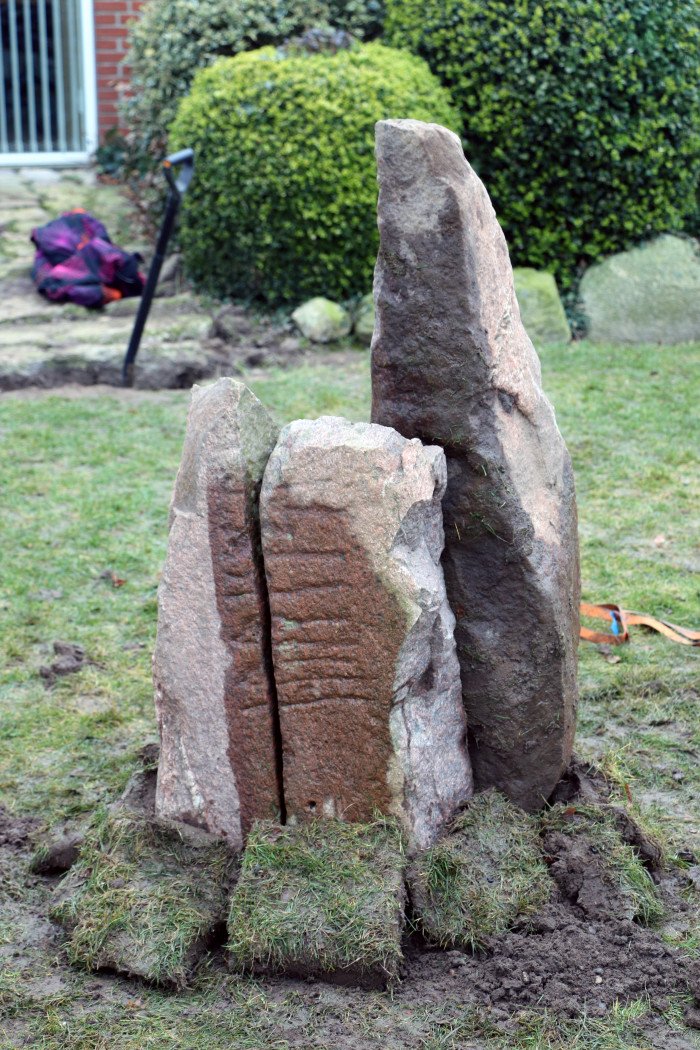Missing 1,000-Year-Old Viking Rune Stone Made By Runemaster Fot Discovered In Sweden
– An important 1,000-year-old Viking rune stone made by Fot runemaster has been discovered in Sweden. The rune stone has been missing for two centuries and was finally found by pure chance not far from Uppsala, a sacred Viking and Pagan site.
It is the second time this year that a missing rune stone has been found in Scandinavia. Earlier this year, the unique, thousand-year-old Thy rune stone was found in Denmark. The ancient Thy rune stone was last seen in 1767 before it mysteriously disappeared. It was found in March 2016 on a farm property.

The Swedish rune stone was discovered during installation work of a lightning conductor at Hagby Church, west of the central Swedish university town of Uppsala. It was found underground a few metres from the building.
“We knew that there had been a medieval church there, but didn’t know that this rune stone was in that exact location. ,” Emelie Sunding, archaeologist at Uppland Museum said.
Archaeologists believe that the rune stone, measuring around 180 by 135 centimetres, was first erected in the mid-11th century. Records show that it was used as a threshold leading up to the church porch in the Middle Ages, before somehow disappearing when the old building was torn down in the 1830s.
“The stone is known from before. It was depicted in the 17th century and when the medieval church was torn down in the 19th century we have written records that mention the stone as lost and that it had maybe been moved,” said Sunding.
The rune stone is well-preserved, but one piece is missing so not all the inscriptions can be deciphered. A drawing from the 17th century quotes some of the runes as saying: “Jarl and …stone for Gerfast, his father”.
Fot, sometimes known as Foto was a runemaster who lived and worked in the area in the mid 11th-century and has created and signed several famous rune stones found in Sweden. Fot is prominent among the known runemasters as the leading representative of the classic Uppland or Urnes runestone style, and has been called the most artistic of the runemasters of that time.
“This one isn’t signed, but we can tell from the style and the ornaments that this is Fot,” said Sunding.
The runestone will now be cleaned and then possibly re-erected at Hagby Church.
Runes played an important part in the lives of the Vikings. Unfortunately, there are few remains of runic writing on paper from the Viking era. Nevertheless, thousands of stones with runic inscriptions have been found where Vikings lived. In this article we unravel the mystery of runes and examine significant facts and history that provide us with a better understanding of these ancient inscriptions and Odin’s secret language.
Thousands of inscriptions in stone, wood and metal have been unearthed, and each item gives us a glimpse into a culture who believed in the power and protection of the gods, telling fortunes and casting spells, and the glory of war.
The word “rune” comes from Old Norse and means “Secret knowledge and wisdom”. The true age and origin of the runes is still shrouded in mystery. Symbols resembling runes appear as cave markings as early as the late Bronze Age. It was not until about 200 AD, when the runemal (i.e. the art of runic interpretation) was wide-spread in Northern Europe that the runic alphabet emerged.
Learn more about Runes: Facts And History About Odin’s Secret Language



 Creators of mankind
Creators of mankind Description of “Tall white aliens”
Description of “Tall white aliens” Where they came from?
Where they came from? About hostile civilizations
About hostile civilizations The war for the Earth
The war for the Earth “Tall white aliens” about eternal life
“Tall white aliens” about eternal life Video: “Nordic aliens”
Video: “Nordic aliens” Aliens
Aliens Alien encounters
Alien encounters The aliens base
The aliens base UFO
UFO Technology UFO
Technology UFO Underground civilization
Underground civilization Ancient alien artifacts
Ancient alien artifacts Military and UFO
Military and UFO Mysteries and hypotheses
Mysteries and hypotheses Scientific facts
Scientific facts


















